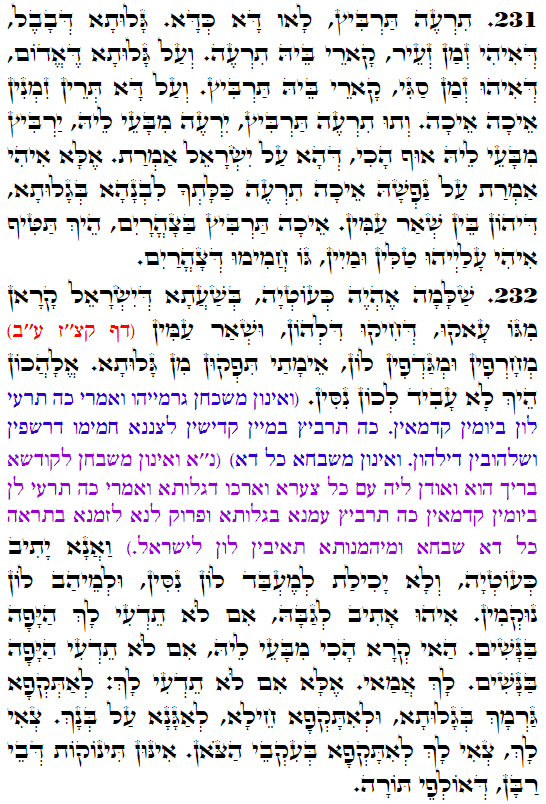Daily Zohar # 3392 – Balak – She can makes miracles for us when…
.
Hebrew translation:
232. שַׁלָּמָה אֶהְיֶה כְּעֹטְיָה. בְּשָׁעָה שֶׁיִּשְׂרָאֵל קוֹרְאִים מִתּוֹךְ צָרָה וְדֹחַק שֶׁלָּהֶם, וּשְׁאָר הָעַמִּים מְחָרְפִים וּמְגַדְּפִים אוֹתָם: מָתַי תֵצְאוּ מֵהַגָּלוּת? אֵיךְ אֱלֹהֵיכֶם אֵינוֹ עוֹשֶׂה לָכֶם נִסִּים? (וְהֵם מַמְצִיאִים עַצְמָם וְאוֹמְרִים, כֹּה תִרְעֶה אוֹתָנוּ בַּיָּמִים הָרִאשׁוֹנִים, כֹּה תַרְבִּיץ בַּמַּיִם הַקְּדוֹשִׁים לְצַנֵּן הַחֲמִימוּת שֶׁל רְשָׁפִים וְשַׁלְהָבוֹת שֶׁלָּהֶם. וְהֵם מְשַׁבְּחִים כָּל זֶה) (וְהֵם מְשַׁבְּחִים לַקָּדוֹשׁ-בָּרוּךְ-הוּא וּמוֹדִים לוֹ עִם כָּל הַצַּעַר וַאֲרִיכוּת הַגָּלוּת, וְאוֹמְרִים, כֹּה תִרְעֶה אוֹתָנוּ בַּיָּמִים הָרִאשׁוֹנִים, כֹּה תַרְבִּיץ עִמָּנוּ בַּגָּלוּת וְתִגְאַל אוֹתָנוּ לַזְּמַן הָאַחֲרוֹן. כָּל זֶה שֶׁבַח וֶאֱמוּנָה שֶׁמַּתְאִים לָהֶם לְיִשְׂרָאֵל) וַאֲנִי יוֹשֵׁב כְּעֹטְיָה וְלֹא יָכוֹל לַעֲשׂוֹת לָהֶם נִסִּים וְלָתֵת לָהֶם נְקָמוֹת. הוּא מֵשִׁיב לָהּ: אִם לֹא תֵדְעִי לָךְ הַיָּפָה בַּנָּשִׁים. פָּסוּק זֶה כָּךְ צָרִיךְ לְכָתְבוֹ: אִם לֹא תֵדְעִי הַיָּפָה בַּנָּשִׁים. לָמָּה לָךְ? אֶלָּא, אִם לֹא תֵדְעִי לָךְ – לְחַזֵּק עַצְמֵךְ בַּגָּלוּת וּלְהַגְבִּיר כֹּחַ לְהָגֵן עַל בָּנַיִךְ – צְאִי לָךְ, צְאִי לָךְ לְהִתְחַזֵּק בְּעִקְבֵי הַצֹּאן. אוֹתָם תִּינוֹקוֹת שֶׁל בֵּית רַבָּן שֶׁלּוֹמְדִים תּוֹרָה.
.
Zohar Balak
Songs 1:7 “הַגִּידָה לִּי שֶׁאָהֲבָה נַפְשִׁי אֵיכָה תִרְעֶה אֵיכָה תַּרְבִּיץ בַּצָּהֳרָיִם שַׁלָּמָה אֶהְיֶה כְּעֹטְיָה עַל עֶדְרֵי חֲבֵרֶיךָ.” “Tell me, O you whom I love, Where you (אֵיכָה) feed your flock, Where you (אֵיכָה) make it rest at noon. For why should I be as one who veils herself By the flocks of your companions?”
#231
The Shechina is the one that provides for us. She asks the Holy One how will she be with her children when they are in exile, among the other nations. How would she ‘feed your flock’ with Chassadim. She wants to ‘make it rest at noon’, which is protecting her children from the judgments of the other-side.
The Zohar also explains that ‘Where you feed your flock is related to the Babylonian exile that was short. ‘Where you make it rest’ is related to the exile of Edom because it is longer.
#232
The Shechina in exile is hidden and she can’t help her children with miracles. She asks; ‘For why should I be as one who veils herself’ when her children are having troubles in exile among nations that hate them, insult them, and want them out of their countries. She wants to take revenge on their enemies.
The Holy One, Zeir Anpin, tells her (Songs 1:8) “אִם לֹא תֵדְעִי לָךְ הַיָּפָה בַּנָּשִׁים צְאִי לָךְ בְּעִקְבֵי הַצֹּאן וּרְעִי אֶת גְּדִיֹּתַיִךְ עַל מִשְׁכְּנוֹת הָרֹעִים.” “If you do not know, O fairest among women, Follow in the footsteps of the flock, And feed your little goats Beside the shepherds’ tents.”
His advice for her is to get stronger by following the ‘flock’ who are the children that study Torah. From them, she can draw the power to protect her children.
Lesson;
At the times when the Holy Temples were active, the priests drew light for the nation and for the whole world with their daily services. After their destruction, the Shechina is out of her home, in exile with her children.
When we study in purity like innocent children that don’t have a long list of sins, the Shechina supports our connection to Zeir Anpin and use this light to make miracles for us.
{||}

 Previous: Balak
Previous: Balak

